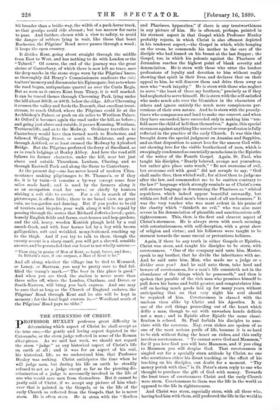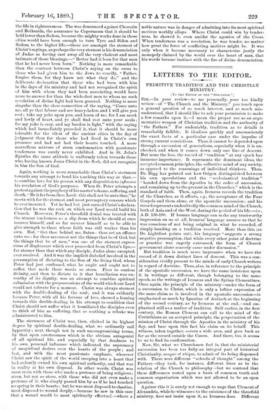THE STERNNESS OF CHRIST.
PROFESSOR Hl7XLEY professes great difficulty in determining which aspect of Christ he shall accept as the true one,—the gentle and loving aspect depicted in the Catecombs, or the stern judge reflected in some of the Roman altar-pieces. As we said last week, we should not regard the stern " judge " as any historical aspect of Christ's life on earth at all ; and it was for an aspect of his real, his historical, life, as we understand him, that Professor Huxley was seeking. Christ anticipates the time when he will judge men, but during his life on earth he steadily refused to act as a judge except so far as the piercing dis- crimination of a judge is necessarily involved in the life of one who would save men from themselves. But it cannot be justly said of Christ, if we accept any picture of him what- ever that is painted in the Gospels, or in the life of the early Church as reflected from the Gospels, that he is never stern. He is often stern. He is stern with the " Scribes and Pharisees, hypocrites," if there is any trustworthiness in any picture of him. He is oftenest, perhaps, painted in his sternest aspect in that Gospel which Professor Huxley probably rejects, in which Christ is also oftenest depicted in his tenderest aspect,—the Gospel in which, while banging on the cross, he commends his mother to the care of the disciple who had leaned on his breast at the last Supper ; the Gospel, too, in which his polemic against the Pharisees of Jerusalem reaches the highest point of blank severity and denunciation. He is stern with those who utter the loudest professions of loyalty and devotion to him without really showing that spirit in their lives, and declares that on their appeal to him, he will disavow them and drive them away as men who " work iniquity." He is stern with those who neglect to serve "the least of these my brethren," precisely as if they had neglected to serve himself. He is stern with the self-satisfied who make much ado over the blemishes in the characters of others and ignore entirely the much more conspicuous per- versions of their own nature. And he is stern with the prosely- tisers who compass sea and land to make one convert, and when they have succeeded, have succeeded only in making him " ten- fold more the child of hell than themselves." Again, this special sternness against anything like unreal or over-profession is fully reflected in the practice of the early Church. It was this that brought down the special judgment on Ananias and Sapphira, and on that disposition to assert love for the unseen God with- out showing love for the visible brotherhood of men, which is sweepingly condemned as essentially mendacious in the Epistles of the writer of the Fourth Gospel. Again, St. Paul, who taught his disciples, " Dearly beloved, avenge not yourselves, but rather give place unto wrath," " Be not overcome of evil, but overcome evil with good," did not scruple to say, " God shall smite thee, thou whited wall ; for sittest thou to judge me after the law, and commandest me to be smitten contrary to the law ?" language which strongly reminds us of Christ's own still sterner language in denouncing the Pharisees as " whited sepulchres, which indeed appear beautiful outwardly, but within are full of dead men's bones and of all uncleanness." It was the very teacher who was most ardent in his praise of the charity which " thinketh no evil," who was also most severe in his denunciation of plausible and sanctimonious self- righteousness. This, then, is the first and clearest aspect of Christ's sternness. He is always stern with much seeming, with ostentatiousness, with self-deception, with a great show of religion and virtue ; and his followers were taught to be sternest towards the same unreal or pretentious holiness.
Again, if there be any truth in either Gospels or Epistles, Christ was stern, and taught his disciples to be stern, with covetousness. " One of the company said unto him, Master, speak to my brother, that he divide the inheritance with me. And he said unto him, Man, who made me a judge or a divider over you? And he said unto them, take heed and beware of covetousness, for a man's life consisteth not in the abundance of the things which he possesseth," and then is spoken that parable of the rich man who promises himself to pull down his barns and build greater, and congratulates him- self on having much goods laid up for many years, without anticipating that on that very night his soul should be required of him. Covetousness is classed with the unclean vices alike by Christ and his Apostles. It is one of the evil things proceeding out of the heart which defile a man, though to eat with unwashen hands defileth not a man ; and in Epistle after Epistle the same classi- fication is echoed. St. Paul forbids his disciples to asso- ciate with the covetous. Nay, even riches are spoken of as one of the most serious perils of life, because it is so hard to be rich without fixing the heart on riches, and this really involves covetousness. " Ye cannot serve God and Mammon," for if you love God you will hate Mammon, and if you cling to Mammon you will despise God. That covetousness is singled out for a specially stern attitude by Christ, no one who scrutinises either his direct teaching, or the effect of his teaching on his disciples, can doubt for a moment. " Thy money perish with thee," is St. Peter's stern reply to one who thought to purchase the gift of God with money. Towards the least trace of covetousness Christ and the early Church were stern. Covetousness to them was the life in the world as opposed to the life in righteousness.
And Christ was stern, especially stern, with all those who, having had him with them, still preferred the life in the world to the life in righteousness. The woe denounced against Chorazin and Bethsaida, the assurance to Capernaum that it should be held lower than Sodom, because the mighty works done in those cities would have been enough to turn Tyre and Sidon and Sodom to the higher life,—these are amongst the sternest of Christ's sayings, as perhaps the very sternest is his denunciation of Judas as having cast away all the very choicest and most intimate of those blessings,—" Better had it been for that man that he had never been born." Nothing is more remarkable than the contrast- between Christ's saying on the cross to those who had given him to the Jews to crucify, " Father, forgive them, for they know not what they do," and the deliberate declaration that those who had been with him in the days of his ministry and had not recognised the spirit of him with whom they had been associating, would have more to answer for than the wickedest men to whom no such revelation of divine light bad been granted. Nothing is more singular than the close connection of the saying, "Come unto me, all ye that labour and are heavy-laden, and I will give you rest ; take my yoke upon you, and learn of me, for I am meek and lowly of heart, and ye shall find rest unto your souls ; for my yoke is easy, and my burden is light," with the saying which had immediately preceded it, that it should be more 'tolerable for the vilest of the ancient cities in the day of judgment than for those who had lived in Christ's own presence and had not had their hearts touched. A more marvellous mixture of stern condemnation with passionate tenderness was surely never exhibited. And in St. John's Epistles the same attitude is uniformly taken towards those who, having known Jesus Christ in the flesh, did not recognise in him the Son of God.
Again, nothing is more remarkable than Christ's sternness towards any attempt to bend his teaching this way or that,— to combine love for his person with any disposition to influence his revelation of God's purposes. When St. Peter attempts a protest against the prophecy of his master's shame, suffering, and death, "Be it far from thee, Lord: this shall not be unto thee," he meets with far the sternest and most peremptory censure which he ever incurred. Yet he had but just earned Christ's declara- tion that he was the rock on which our Lord would build his Church. Moreover, Peter's threefold denial was treated with the utmost tenderness as a slip from which he should at once recover himself, and so far recover himself as to be able to give strength to those whose faith was still weaker than his own. But, " Get thee behind me, Satan : thou art an offence unto me : for thou savourest not the things that be of God, but the things that be of men," was one of the sternest expres- sions of displeasure which ever proceeded from Christ's lips,— far sterner than that which any disciple, Judas alone excepted, ever received. And it was the implicit disbelief involved in the presumption of dictating to the Son of the living God, whom Peter had just confessed, what he ought and ought not to suffer, that made these words so stern. First to confess divinity, and then to dictate to it that humiliation was un- worthy of its dignity, was an attempt to combine spiritual submission with the prepossessions of the world which our Lord would not tolerate for a moment. Christ was always sternest with the double-dealing of the soul; and it was evidently because Peter, with all his fervour of love, showed a leaning towards this double-dealing in his attempt to condition that Christ should not suffer what it humiliated the disciples even to think of him as suffering, that so scathing a rebuke was administered to him.
The sternness of Christ was, then, elicited in its highest degree by spiritual double-dealing, what we ordinarily call hypocrisy; next, though not in such uncompromising terms, by that open covetousness which is the obvious antagonist c4 all spiritual life, and especially by that deadness to his own personal influence which indicated the supremacy of unspiritual desires over the hearts of the people ; and last, and with the most passionate emphasis, wherever Christ saw the spirit of the world creeping into a heart that had ardently owned his own spiritual authority, and that was in reality at his own disposal. In other words, Christ was most stern with those who made a pretence of being religions ; stern, but not so stern, with those who did not even make a pretence of it, who simply passed him by as if he had touched no spring in their hearts ; but he was most disposed to chastise, most disposed to wound deeply,—because he saw in this case that a wound would be most spiritually effectual,—where a noble nature was in danger of admitting into its most spiritual motives worldly alloys. Where Christ could win by tender- ness, he showed it, even amidst the agonies of the Cross. When tenderness was a revelation, he was tender, no matter how great the force of conflicting motives might be. It was only when it became necessary to characterise justly the monopoly claimed by the world over the heart of man, that his words became instinct with the fire of divine denunciation.







































 Previous page
Previous page